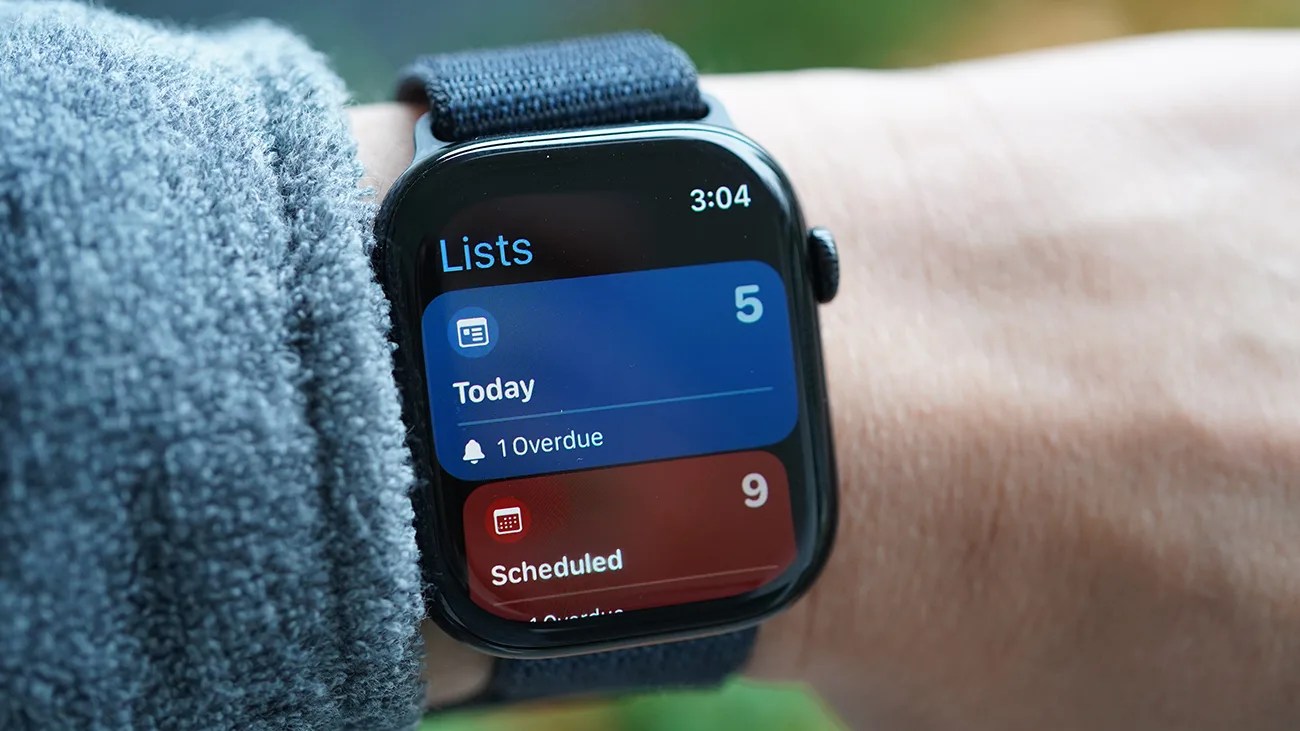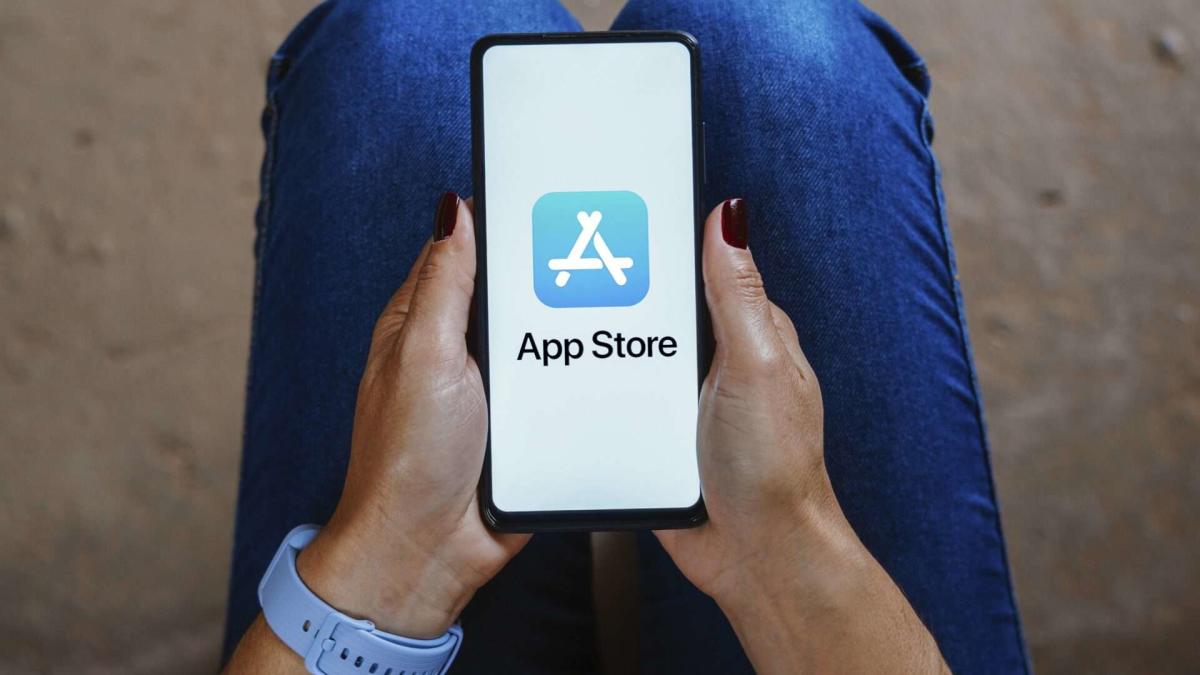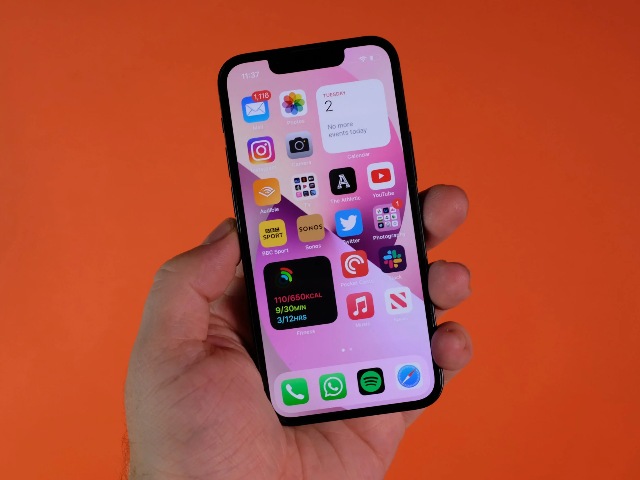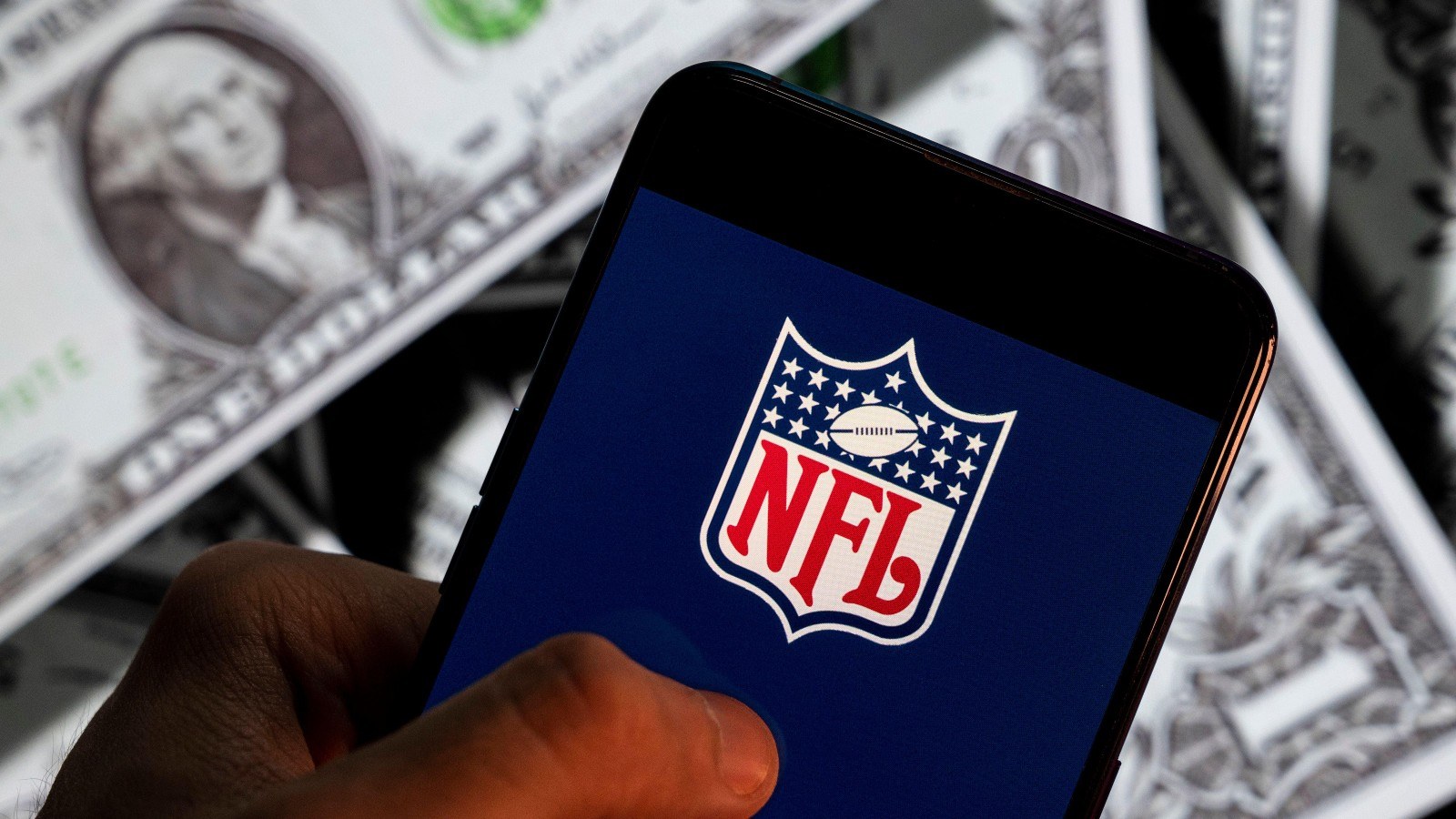Workout apps have transformed the fitness landscape, offering personalized training experiences at your fingertips. These digital fitness companions cater to various goals, from strength training to yoga and cardio. Many apps provide guided workouts, progress tracking, and nutrition advice. The best workout apps blend expert instruction with user-friendly interfaces. They adapt to different fitness levels and offer features like heart rate monitoring and meal planning. Some apps focus on specific workout types, while others provide a wide range of exercises. Choosing the right app depends on your fitness goals, preferred workout style, and budget. Workout apps have exploded in popularity, offering convenience, affordability, and personalized guidance to help you achieve your fitness goals. But with so many options available, finding the best workout app for your needs can be challenging. This ranked list explores some of the top contenders for 2025, considering factors like workout variety, personalization, user experience, and overall value. BetterMe stands out with its holistic approach to wellness. It combines personalized workout plans with nutritional guidance and mental health support. The app offers a wide range of exercises, from beginner-friendly to advanced, and caters to various fitness goals. Pros: Cons: While known for its stationary bikes and treadmills, Peloton also offers a comprehensive app with diverse workout classes. From cycling and running to strength training, yoga, and meditation, Peloton provides high-quality instruction and a motivating community atmosphere. Pros: Cons: Fitbod excels in creating customized strength training plans based on your fitness level, goals, and available equipment. The app intelligently adapts your workouts, ensuring you progress effectively and avoid plateaus. Pros: Cons: Nike Training Club provides a fantastic selection of workouts and programs completely free. With various formats, from bodyweight training and yoga to HIIT and running, the app caters to all fitness levels and goals. Pros: Cons: Future offers a unique approach with dedicated coaching from certified personal trainers. You’ll receive personalized workout plans, regular check-ins, and ongoing support to keep you motivated and accountable. Pros: Cons: The ideal workout app depends on your individual preferences and goals. Consider what type of exercise you enjoy, your budget, and whether you prefer personalized plans or a wider variety of classes. Try out free trials or freemium versions to find the app that best fits your needs and helps you achieve your fitness goals. [embed]https://www.youtube.com/watch?v=U9ENCvFf9yQ[/embed] 8fit combines workout videos and meal planning in one app. Users set fitness goals, and 8fit creates a custom program. The app offers exercise videos, food logging, and meal plans with recipes and shopping lists. The free version has limited workouts and basic tracking features. The Pro version unlocks more benefits: Pro plan pricing: 8fit works well for those who want structure in their fitness journey. The app guides users through workouts and nutrition, making it easier to stick to a routine. Video workouts offer clear instructions, mimicking the experience of having a personal trainer. The meal planning feature helps users align their diet with their fitness goals. It takes the guesswork out of healthy eating by providing recipes and shopping lists. 8fit’s strength lies in its holistic approach. By combining exercise and nutrition, it addresses two key aspects of fitness. This makes it a good choice for beginners or those who prefer a more guided experience in their at-home workouts. [embed]https://www.youtube.com/watch?v=v5idoBy6KLw[/embed] Aaptiv offers audio-based workouts that free users from screen dependency. The app provides trainer-led exercises with background music. Users can select from preset music styles or link their Spotify accounts. The app tailors workout recommendations based on user preferences. These include exercise types like stretching, strength training, yoga, indoor cycling, outdoor running, and stair climbing. Music preferences are also factored in. Aaptiv offers a seven-day free trial through its web app, though credit card details are required. Regular pricing is $14.99 monthly or $99.99 annually. Discounts are often available. The app covers various cardio sessions and interval training options. It suits users who prefer audio guidance for their cardio workouts. Aaptiv is accessible on Android, iOS, and web platforms. Key features: Aaptiv caters to those who want hands-free, eyes-free workout experiences. Its audio format allows users to focus on their movements without visual distractions. Apple Fitness+ offers a wide range of workout videos for the whole family. The app’s clean design makes it easy to use. It works with Apple Watch to track exercises automatically. Classes cover many types: Users can make custom plans based on: The service costs $9.99 monthly or $79.99 yearly. A free month trial is available. Family Sharing lets up to 5 family members use one subscription at no extra cost. New device buyers get 3 free months with: Pros: Cons: Apple Fitness+ works on iOS devices and Apple TV. It aims to make fitness fun and accessible for families. Body by Blogilates stands out as a top-tier free fitness app. Users can access a wide range of workouts without creating an account. The app features video exercises led by Cassey Ho, who performs the routines alongside viewers. The app focuses on: Key features include: While the free version offers plenty, paid subscriptions are available: Body by Blogilates is accessible on Android, iOS, and web platforms. Its user-friendly interface and varied workout options make it a solid choice for those seeking free fitness content. The app caters to different fitness levels and preferences. Beginners can start with basic bodyweight exercises, while more advanced users can challenge themselves with complex pilates routines. Body by Blogilates updates its content regularly, keeping workouts fresh and engaging. This helps users stay motivated and prevents workout boredom. Centr offers a comprehensive fitness solution inspired by Chris Hemsworth’s rigorous training routine. The app provides a mix of guided and self-directed workouts tailored to individual goals. Users can choose from muscle-building, weight loss, or general fitness programs. Workout styles include: The app features: Pricing: A 7-day free trial is available, but credit card information is required. Centr stands out for its celebrity endorsement and varied workout options. The app’s strength lies in its tough, Thor-inspired routines that challenge users to push their limits. HIIT sessions boost cardiovascular fitness, while strength training helps build muscle mass. The cardio endurance workouts improve stamina and overall fitness. Users benefit from the app’s flexibility, allowing them to switch between coached and self-guided sessions. This variety keeps workouts fresh and engaging. The nutritional component complements the exercise regimen, supporting users’ fitness goals. Find What Feels Good (FWFG) is a popular yoga platform created by Adriene Mishler. It offers a wide range of yoga classes and sessions for practitioners of all levels. The platform provides access to exclusive videos, premium courses, and vlogs from Adriene herself. FWFG’s library includes: New instructors have joined the platform, expanding the variety of classes available. This diversity allows users to explore different styles and approaches to yoga. The platform is accessible on: Subscription options: FWFG regularly updates its content, giving subscribers access to new videos as they’re added. This keeps the platform fresh and engaging for long-term users. While FWFG offers a paid subscription, many free yoga videos are still available on Adriene’s YouTube channel. These free resources provide a taste of her teaching style and can help users decide if they want to invest in the full FWFG experience. FitOn stands out as a versatile workout app. It offers a wide range of video-based exercise routines led by professional trainers. Users can choose workouts based on their available time, desired intensity level, or preferred style. The app includes options for yoga, targeted body area exercises, and full-body workouts. FitOn provides many features at no cost: For those seeking additional features, FitOn offers a Pro account. This paid version includes: FitOn caters to different fitness goals through its diverse workout selection. Users can easily find exercises that align with their objectives, whether it’s improving flexibility, building strength, or enhancing cardiovascular health. The app’s structure allows for creating custom workouts tailored to individual preferences. This personalized approach helps users stay motivated and consistent with their fitness routines. FitOn is available on multiple platforms: This cross-platform availability ensures users can access their workouts from various devices, adding convenience to their fitness journey. Jefit stands out as a robust weight training tracker. The app offers a comprehensive set of tools for gym-goers. Users can log their lifting sessions, including weights, reps, and sets. Jefit’s exercise library is extensive, covering various muscle groups. The app’s free version provides ample features. It includes pre-made routines and the ability to create custom workouts. Users can track body measurements and view their progress over time. A built-in calendar helps plan workout days and rest periods. Jefit’s interface is user-friendly. The search function allows quick access to exercises by muscle group. This feature is helpful for both beginners and experienced lifters. The app also offers a training schedule, showing upcoming workouts at a glance. For those seeking more, Jefit offers an Elite membership. This paid version removes ads and adds advanced features. Users gain access to video exercise instructions, detailed progress charts, and goal-setting tools. The annual subscription is $69.99, with a monthly option at $12.99. Jefit is available on multiple platforms: This cross-platform availability ensures users can track their workouts anywhere. The app syncs data across devices, maintaining a consistent record of progress. Jefit’s focus on weight training makes it a top choice for strength enthusiasts. Nike’s Training Club app offers a comprehensive fitness solution for those seeking long-term exercise commitment. The app provides a wide range of workout videos, from quick yoga sessions to hour-long routines. Users can access various programs designed to build consistency over time. Key features: The app includes healthy recipes and nutrition tips to support a holistic approach to fitness. Its achievement system helps users stay motivated by setting goals and tracking progress. Nike Training Club caters to different fitness levels and preferences: The app’s flexibility allows users to choose between quick workouts and more intensive programs. This variety helps maintain interest and prevents workout monotony, a common barrier to long-term fitness commitment. Peloton’s app offers a wide range of fitness classes led by enthusiastic instructors. Users can access yoga, cardio, and strength training sessions without owning Peloton equipment. The app features live classes and on-demand workouts with upbeat music and motivational coaching. Two subscription tiers are available: Peloton App One ($12.99/month): Peloton App+ ($24/month): The app supports outdoor activities and syncs with Apple Health. Android users may face some technical issues with outdoor tracking and device connectivity. Key features: Peloton’s digital platform brings studio-quality fitness experiences to users’ homes. The app’s strength lies in its lively instructors and varied class offerings, making it suitable for those seeking motivation in their fitness journey. Shred offers tailored workout plans for muscle building and strength training. The app creates custom routines based on user goals, available equipment, and time constraints. It covers both home and gym settings, making it versatile for various fitness levels. Key features: Shred provides video demonstrations for exercises. Some workouts feature trainer-led sessions, while others offer exercise clips with rep tracking. This mix supports proper form and technique learning. The app’s strength training focus aligns well with muscle growth goals. It allows users to progressively increase intensity, a crucial factor in hypertrophy. Cross-training elements are also incorporated, promoting overall fitness alongside muscle development. Pricing: Shred is compatible with both Android and iOS devices. Its flexibility in workout creation and comprehensive exercise library make it a solid choice for those aiming to build muscle, whether at home or in the gym. Strava stands out as a versatile fitness app for runners and cyclists. It tracks over 30 sports, including hiking, swimming, and rock climbing. The app uses GPS from phones or connected devices to map routes and speeds. Strava’s unique feature is its competitive aspect. Users can race against their own times or other athletes on the same segments. This creates virtual leaderboards, adding excitement to workouts. Key features: Strava offers a free version with basic features. For $59.99 per year, users get advanced tools. New members often receive a 30-day free trial. Privacy is important to Strava. The app provides settings to control personal information sharing. Users should review these options carefully. Strava works on: The app appeals to casual athletes and serious competitors. Its social features let users connect with friends and join challenges. Strava’s data analysis helps users improve performance over time. StretchIt offers a range of challenging full-body sessions that can increase heart rate and improve flexibility. The app’s structured programs, such as the Middle Splits Challenge, provide users with clear daily goals. This feature helps maintain consistency in stretching routines. StretchIt caters to specific needs by offering targeted routines for different body parts. Users can focus on areas like back or hip flexibility. The app provides both free and paid content. While the monthly subscription is $19.99, the annual plan at $159.99 offers better value. New users can benefit from: The app is accessible on: StretchIt’s approach combines: These features make StretchIt a solid choice for those looking to improve their mobility and overall flexibility. Fitness app subscriptions often cost less than advertised. Many apps offer free trials, which can lead to discounted rates if canceled before expiration. Patience pays off, as deals frequently appear throughout the year. A reasonable monthly rate ranges from $10 to $13. Anything above $15 should offer exceptional value to justify the cost. Annual subscriptions typically provide better deals, but it’s wise to test an app for at least a month before committing long-term. Free trials and short-term subscriptions help users evaluate content quality and longevity. Some apps front-load their best material, leaving less impressive offerings for later. Key factors to consider when choosing a workout app membership: Table: Workout App Pricing Comparison Some apps charge premium rates, but comparable quality can often be found at lower price points. It’s important to shop around and compare features before committing to a subscription. Tips for finding the best workout app deals: Remember, the most expensive option isn’t always the best. Many affordable apps provide high-quality workouts and features. Assess your fitness goals and budget to find the right balance between cost and value. Smart gym equipment offers high-tech home workouts with on-demand classes. These systems often come with hefty price tags. The Peloton Bike+ costs $2,495 plus a $44 monthly subscription. Popular options include: Key features: Pros: Cons: For those seeking more affordable alternatives, standalone fitness apps offer guided workouts without expensive hardware. Options like Nike Training Club provide free content for various fitness levels. Fitness apps can help users track their health goals, but they also pose potential privacy risks. Users should take precautions to protect their personal information. Before downloading any app, research its reputation and read user reviews. Stick to well-known apps from reputable developers when possible. Once installed, review the app’s privacy settings carefully. Many fitness apps share workout data by default. Users may want to disable features that publicize running routes or other location information. Be selective about granting permissions – only allow access to necessary phone features. Use strong, unique passwords for fitness app accounts. Enable two-factor authentication if available. Be cautious about linking fitness apps to social media profiles or other online accounts. When entering personal details, use the device’s main web browser instead of in-app browsers. This provides an extra layer of security for sensitive data. Consider using a VPN when connecting to public Wi-Fi networks while using fitness apps. Regularly review connected apps and revoke access for any that are no longer used. Delete old accounts and remove personal data from unused fitness services. Stay alert for data breaches affecting fitness companies and change passwords if needed. By taking these steps, users can enjoy the benefits of fitness apps while minimizing privacy and security risks. A proactive approach to data protection helps prevent issues down the road. Many free workout apps cater to newcomers. Nike Training Club offers a wide range of guided workouts. The app provides clear instructions and video demonstrations. Fitbod creates personalized routines based on available equipment. It adapts workouts as users progress. Seven – 7 Minute Workout focuses on quick, equipment-free exercises. This app suits busy schedules and small spaces. MyFitnessPal stands out for calorie counting and food logging. It links with many fitness trackers and apps. Lose It! provides a user-friendly interface for weight loss goals. The app offers meal planning and barcode scanning features. Noom combines food tracking with behavioral change coaching. It aims to create lasting habits for weight management. Workout apps can be useful tools for muscle gain. Strong tracks strength training progress and suggests new exercises. JeFit offers a large exercise library and workout planning features. Progressive overload is key for muscle growth. These apps help users gradually increase weights and reps. However, proper form and nutrition remain crucial for optimal results. Tone It Up focuses on women’s fitness with a supportive community. It offers daily workouts and meal plans. FitOn provides free, celebrity-led workout videos. Classes range from yoga to HIIT. Sweat, created by Kayla Itsines, specializes in strength and cardio programs. These apps often feature workouts requiring minimal equipment. Reddit fitness communities often recommend StrongLifts 5×5 for strength training. It focuses on compound exercises and progressive overload. nSuns is praised for its customizable powerlifting routines. Progression is another well-regarded app for tracking strength gains. These apps tend to appeal to men interested in weightlifting and strength sports. Premium workout app subscriptions vary in price. Monthly fees typically range from $10 to $20. Many apps offer discounts for annual subscriptions. These can cost between $60 and $100 per year. Some apps, like Peloton Digital, charge higher fees but provide extensive content. Free trials are common, allowing users to test premium features before committing.Best Workout Apps: Ranked for 2025
1. BetterMe: Best Overall Workout App
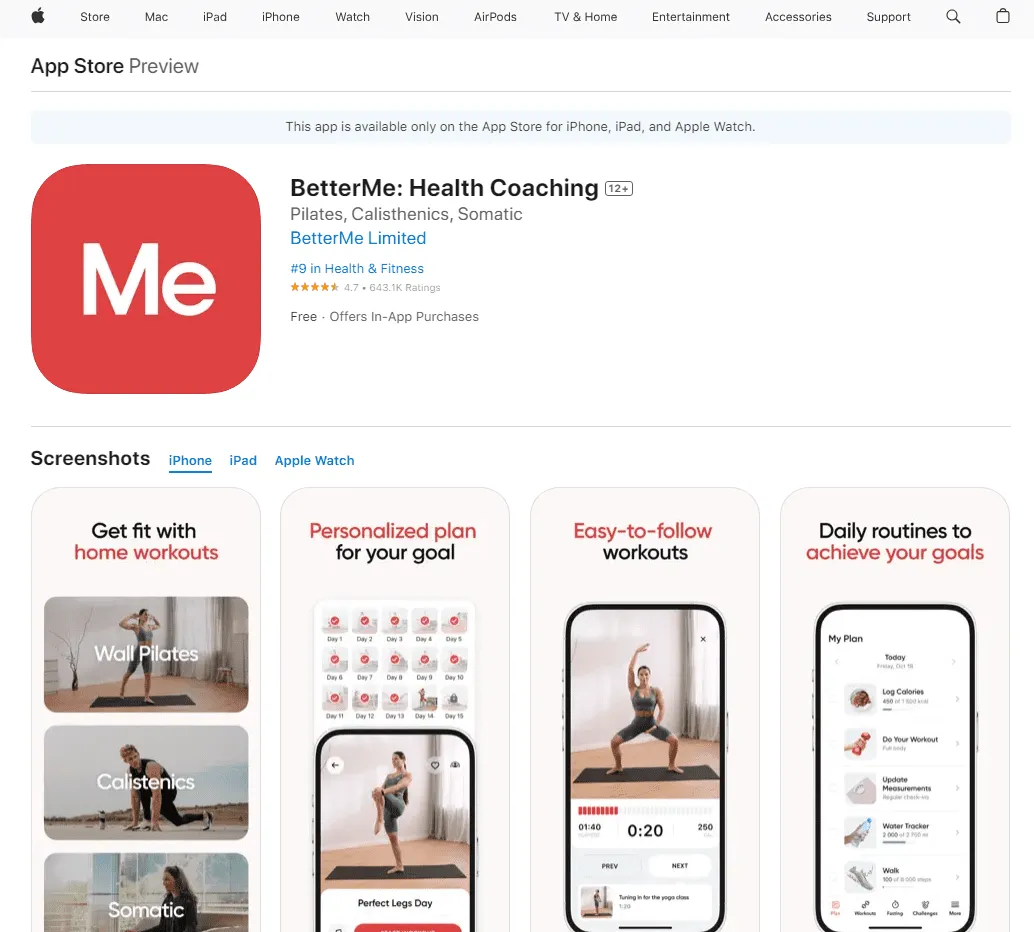
2. Peloton: Best for Live and On-Demand Classes
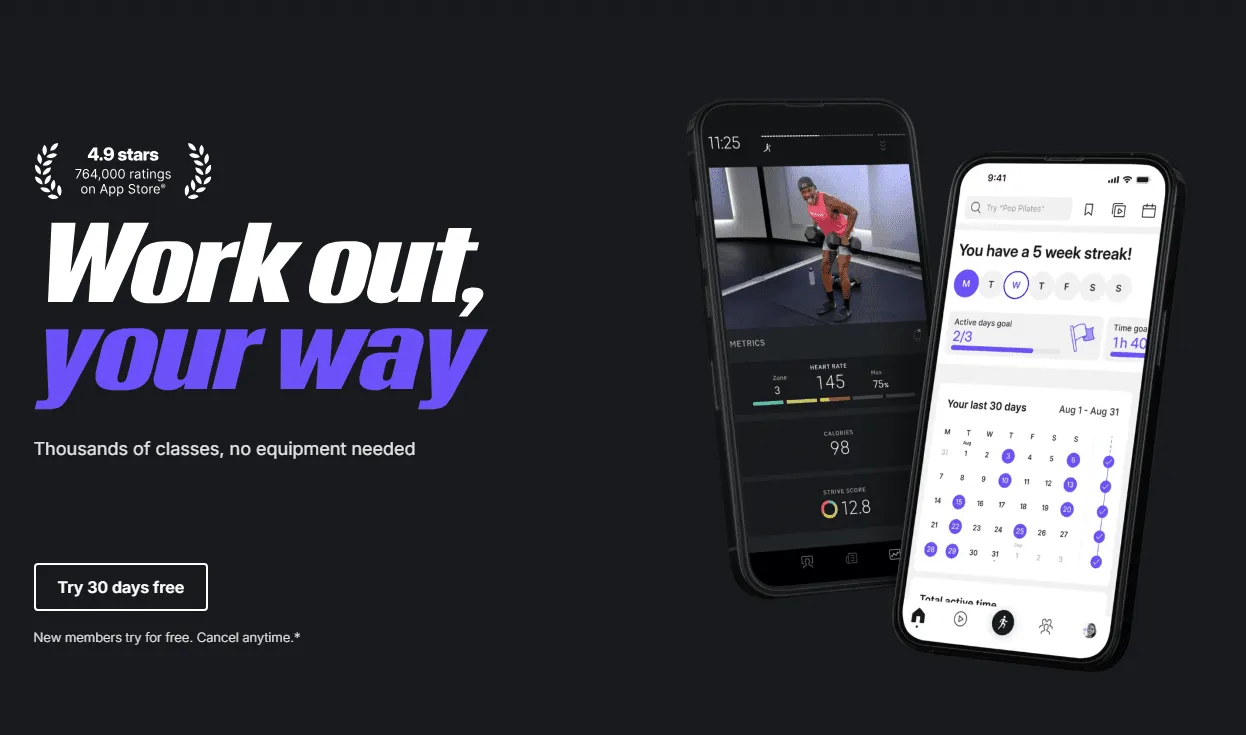
3. Fitbod: Best for Personalized Strength Training
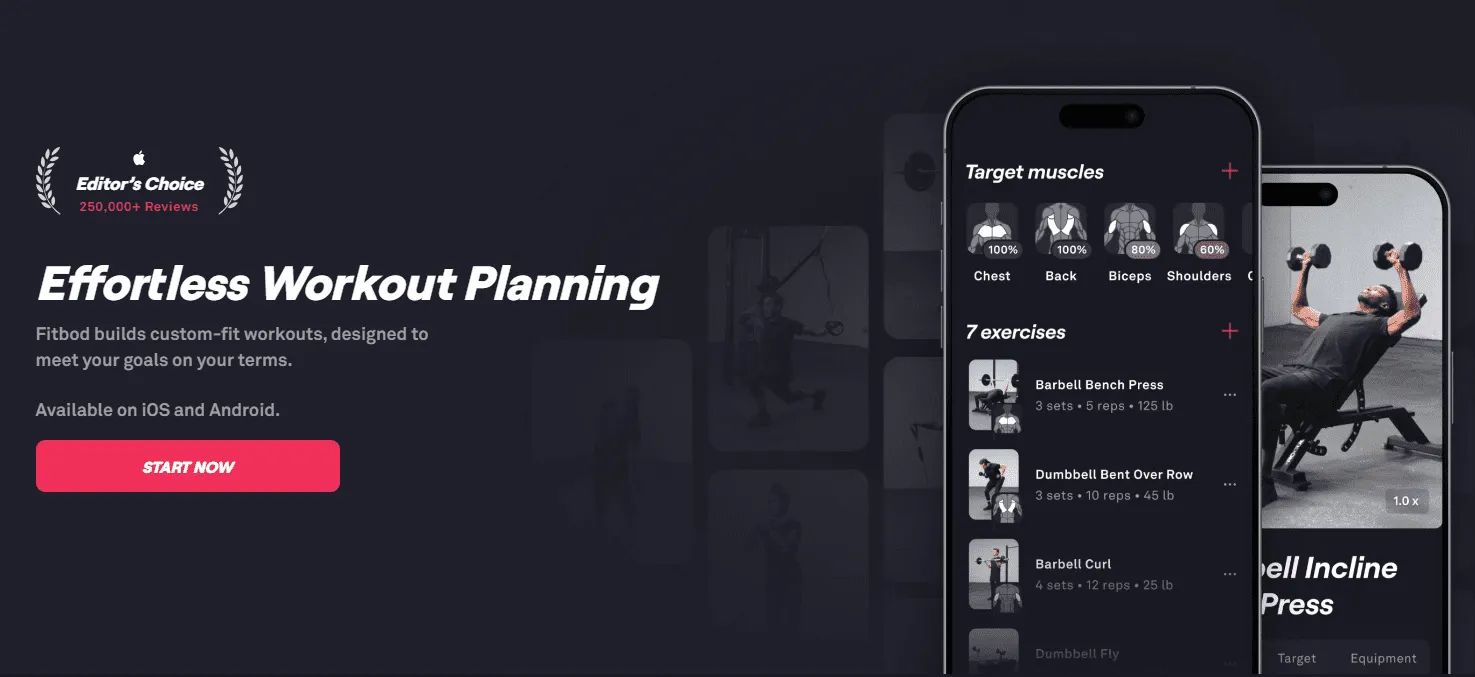
4. Nike Training Club: Best Free Workout App
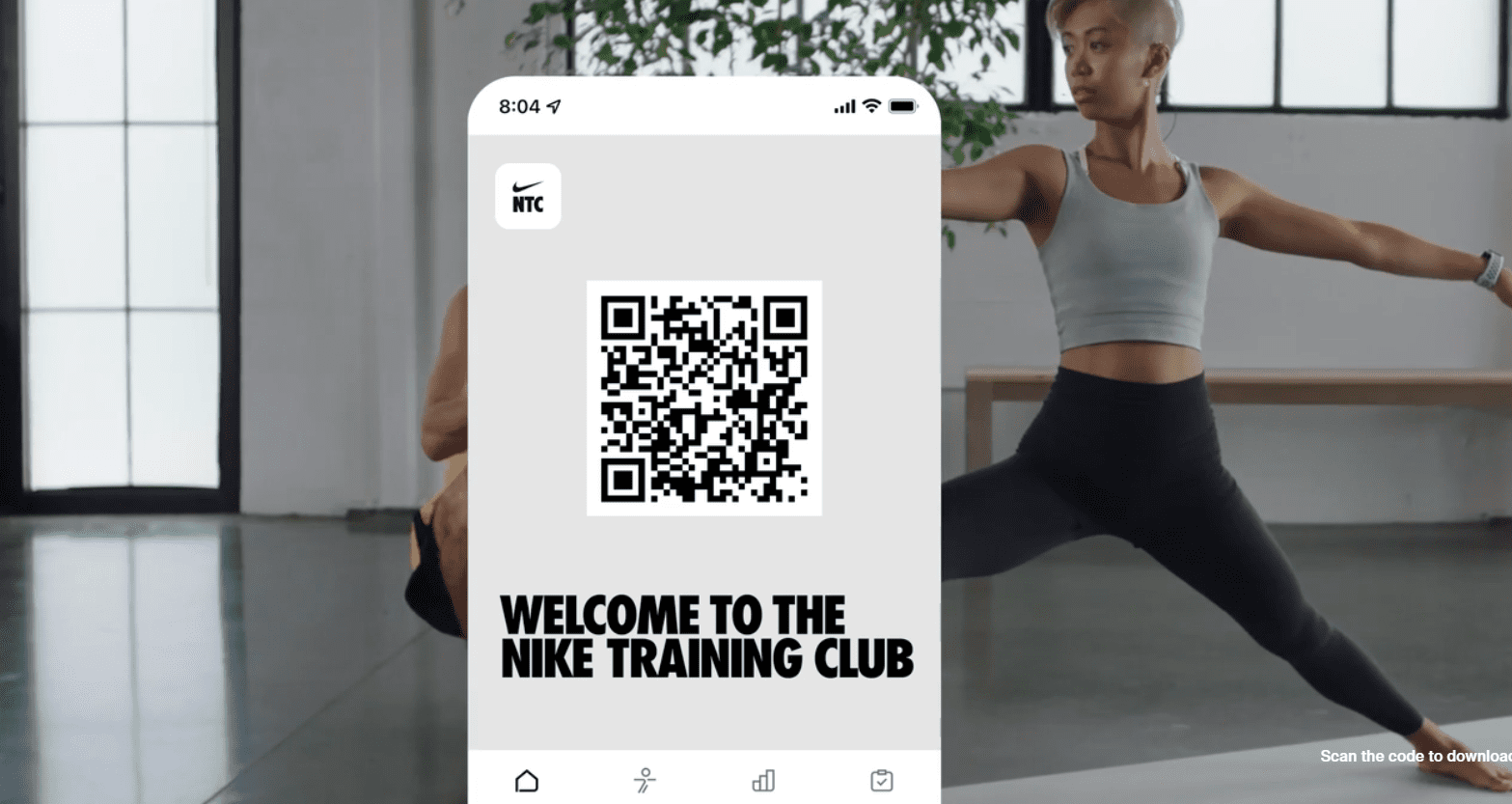
5. Future: Best for Personal Training
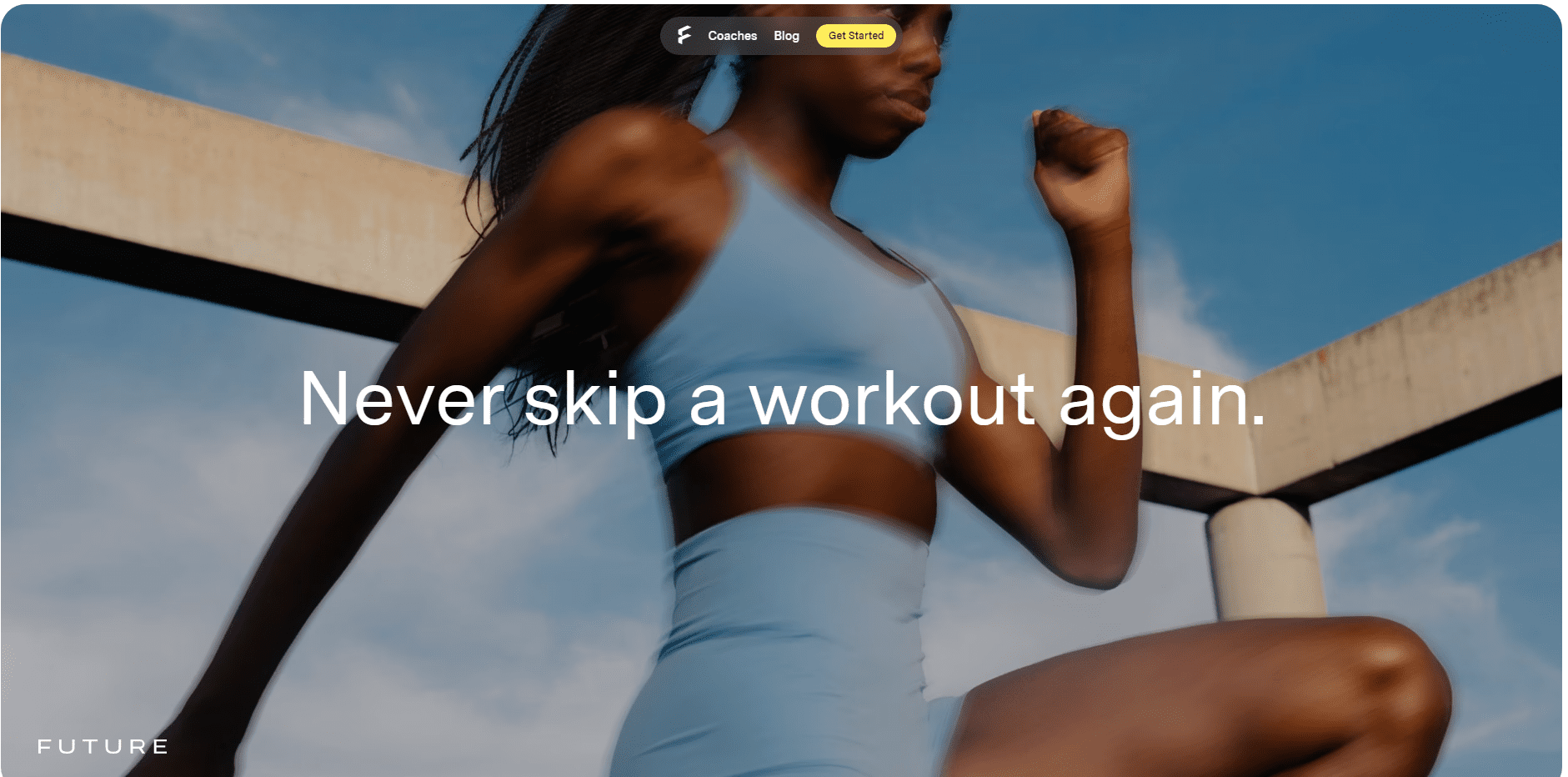
Choosing the Best Workout App for You
Key Takeaways
Expert Guidance and Instruction
8fit
Audio-Guided Fitness Sessions
Aaptiv
Family-Friendly Fitness Options
Apple Fitness+ Workouts
Top Picks for No-Cost Bodyweight and Mat Exercises
Body by Blogilates
Subscription Price Features Workout Pass $3.99/month or $39.99/year Workout Calendar, all challenges and programs All-Access Pass $6.99/month or $69.99/year Goal setting, progress journal, water intake tracking, visual meal tracker Challenging Workout Options
Centr: Thor’s Fitness Regimen
Top Free Yoga Video Resources
Find What Feels Good
Workout Selection Based on Time, Intensity, and Style
FitOn: Tailored Exercise Programs
Top Weight Training Progress Tracker
Jefit
Sustained Fitness Commitment
Nike Training Club App
User Type Suitable Content Beginners Short, low-impact workouts Advanced Longer, high-intensity sessions Families 15-minute fun activities for kids and adults High-Energy Workouts with Expert Guidance
Peloton’s Digital Fitness Platform
Best for Muscle Growth
Shred: Workouts for Home and Gym
Top Choice for Monitoring Runs and Cycling
Strava
Enhancing Flexibility Through Training
StretchIt: A Comprehensive Approach
Workout App Membership Pricing: What’s Fair?
Price Range Value Assessment Free – $9.99 Excellent value, may have limited features $10 – $13 Good value, standard pricing $14 – $19 High-end, should offer premium content $20+ Potentially overpriced, compare alternatives
Smart Gym Equipment Apps
Top Picks for Connected Workouts
• Live and on-demand classes
• Performance tracking
• Leaderboards and social elements
Safeguarding Your Data While Using Fitness Apps
Common Questions About Workout Apps
Top Free Apps for Beginners
Best Apps for Weight Loss and Tracking
Effectiveness for Muscle Gain
Popular Women’s Apps for Home Workouts
Reddit-Recommended Apps for Men
Average Cost of Premium Subscriptions
2024-12-10 18:43:56
Best Workout Apps For 2025
| Name | |
|---|---|
| Publisher | |
| Genre | games news |
| Version | |
| Update | ديسمبر 10, 2024 |
| Get it On |

|























